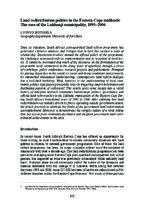Land distribution politics in the Eastern Cape midlands: The case of the Lukhanji municipality, 1995-2006
Abstract
Since its initiation, South Africaʼs post-apartheid land reform programme has
generated extensive analysis and critique that in turn has yielded a body of
scholarship. Discussion revolves around the official policy of the programme,
the challenges associated with its implementation and its reception at local levels.
It cannot be overstated that much of the discourse on the formulation of the
programme itself commenced in the dying years of apartheid, through a series
of workshops, policy conferences, research projects and publications. Prompted
by glaring disparities in the countryʼs social and living conditions and primarily
by entrenched imbalanced landownership, contemporary land reform dialogue
has a well-built backdrop. What, however, is our understanding of local community
politics that played perceptible roles in triggering land redistribution and
facilitating patterns of settlement? This article gives some insight into a veiled
history of interplay between community mobilisation politics, governance and
official land reform policy in the Lukhanji municipality of the Eastern Cape during
South Africaʼs transitional years of 1995 to 2006. After outlining how land
redistribution was initially driven by forces operating outside government action,
the article proceeds to illustrate the frailty of the government land redistribution
accomplishment. Moreover, it demonstrates the complex nature of a rural setting
that has arisen from community-facilitated and incipient government land redistribution
achievements in the area.

